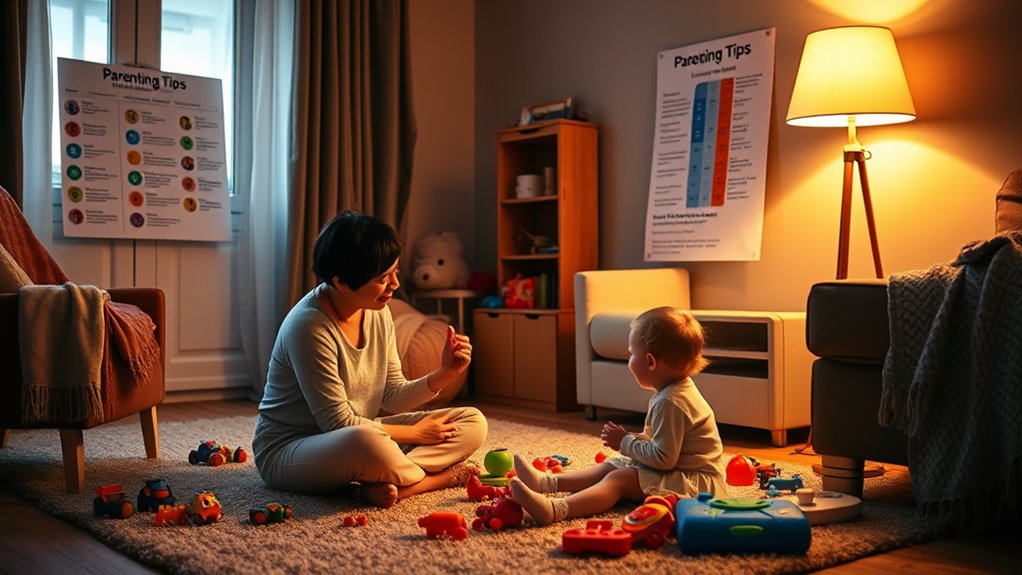How to Raise Resilient Kids in a Challenging World
To raise resilient kids in today’s challenging world, focus on fostering their emotional intelligence and problem-solving skills. Encourage open communication so they can express their feelings and deal with adversity. Build a strong support system by nurturing family connections and engaging with community programs. Promote a growth mindset by teaching them to view failures as opportunities for learning and improvement. Celebrate their efforts and model healthy coping strategies. This foundation will help them thrive and adapt in tough situations. You’ll find even more strategies that can empower your kids to navigate life’s challenges ahead.
Key Takeaways
- Foster strong support systems by nurturing family connections and encouraging open communication for trust and security.
- Encourage problem-solving skills through creative challenges and collaborative projects that promote critical thinking and adaptability.
- Develop emotional intelligence by normalizing discussions about feelings and modeling healthy coping strategies.
- Promote a growth mindset by framing failures as learning opportunities and celebrating efforts over outcomes.
- Create a safe environment that fosters open expression and a sense of belonging, laying the foundation for resilience.
Understanding Resilience in Children
Resilience in children is like a sturdy bridge that allows them to navigate life’s challenges. It’s essential to understand that resilience isn’t just an innate trait; it’s built through experiences and support. When kids face childhood adversity, such as family issues or bullying, the presence of protective factors can significantly influence how they cope. These protective factors include supportive relationships, problem-solving skills, and a sense of belonging.
As a parent or caregiver, you play a vital role in fostering resilience. By creating a safe environment where children feel loved and valued, you’re giving them a solid foundation. Encouraging open communication helps them express their feelings, making it easier to process difficult situations.
It’s also important to let them face challenges rather than shielding them from every setback. This way, they learn to find solutions and develop confidence in their abilities.
Encouraging Problem-Solving Skills
Building on the understanding of how protective factors help children cope with challenges, encouraging problem-solving skills is a key way to foster their resilience. When you present your kids with creative challenges, you’re not just entertaining them; you’re helping them develop critical thinking and adaptability. These activities can range from simple puzzles to more complex tasks that require innovative solutions.
Engaging your children in collaborative projects is another effective approach. Working with peers allows them to share ideas, explore different perspectives, and learn the importance of teamwork. Whether it’s building a model, creating a community garden, or organizing a neighborhood event, these experiences teach them how to navigate obstacles together.
Encourage them to brainstorm solutions when they encounter problems, rather than immediately stepping in to solve things for them. Ask guiding questions that prompt them to think through the issues critically.
Fostering Emotional Intelligence
Fostering emotional intelligence in kids is crucial for their overall development and ability to navigate social interactions. When you help your child understand and manage their emotions, you’re laying a strong foundation for emotional regulation.
Start by encouraging them to express their feelings verbally. Ask open-ended questions like, “How did that make you feel?” This helps them identify and articulate their emotions clearly.
Empathy development is equally important. Encourage your child to consider how others feel by discussing various perspectives. You might say, “How do you think your friend felt when that happened?” This practice not only strengthens their empathy but also enhances their social connections.
Modeling emotional intelligence yourself is key. Show your child how you manage your own emotions in challenging situations, demonstrating healthy coping strategies. Acknowledge their feelings without judgment, reinforcing that it’s okay to feel upset or frustrated.
Lastly, create an environment where emotional discussions are normalized. This means celebrating successes in emotional understanding and addressing setbacks constructively.
Building Strong Support Systems
A strong support system acts like a safety net for kids, providing the encouragement and resources they need to thrive.
It’s essential to nurture family connections and tap into community resources to help your child feel secure and valued. Building this network isn’t just about having people around; it’s about cultivating relationships that empower your child to face challenges head-on.
Here are some ways to strengthen that support system:
-
Encourage open communication****: Let your kids know they can talk to you about anything, creating an atmosphere of trust.
-
Engage with other families: Form friendships with other parents, fostering a sense of belonging for both you and your child.
-
Utilize community programs****: Explore local resources like sports teams, clubs, or workshops that can provide additional support and engagement.
-
Create traditions: Establish family rituals or events that reinforce your bonds and create lasting memories.
When your child knows they’ve a sturdy support system, they’ll be more resilient in facing life’s ups and downs.
Promoting a Growth Mindset
Promoting a growth mindset in your child can transform the way they approach challenges and setbacks. Instead of fearing failure, they’ll start to see it as an opportunity to learn and grow. To nurture this mindset, encourage your child to embrace challenges and remind them that effort is key to improvement.
Consistently use positive reinforcement when they tackle difficult tasks or persevere through obstacles. Celebrate their efforts, not just the outcomes, and praise their willingness to try new things. This can help shift their focus from a fixed mindset—believing their abilities are unchangeable—to a growth mindset, where they understand that they can develop their skills over time.
Encourage them to ask questions and seek feedback, showing them that learning is a continuous journey. Share stories of famous figures who faced setbacks but ultimately succeeded through hard work and determination.
Frequently Asked Questions
What Age Should Resilience Training Start for Children?
Resilience training can start in early childhood, as kids begin to reach developmental milestones. Teaching coping strategies and problem-solving skills during these formative years sets a strong foundation for their emotional growth and future challenges.
How Do I Know if My Child Is Resilient?
How can you tell if your child’s resilient? Look for emotional strength in tough situations and their ability to use coping strategies. If they bounce back from challenges, they’re likely developing strong resilience skills.
Can Resilience Be Taught Through Play?
Yes, resilience can definitely be taught through play activities. Engaging your child in cooperative games helps build emotional skills, like empathy and problem-solving, fostering their ability to navigate challenges and bounce back from setbacks.
What Role Do Teachers Play in Fostering Resilience?
Imagine a classroom where every student feels safe to stumble and rise again. Teacher support in nurturing a positive classroom environment helps kids build resilience, encouraging them to face challenges with confidence and determination.
How Can Parents Model Resilience in Their Own Lives?
To model resilience, you can demonstrate self-care practices and maintain a positive mindset. Show your kids how you handle challenges, emphasizing growth and perseverance, so they learn to navigate difficulties with confidence and strength.





